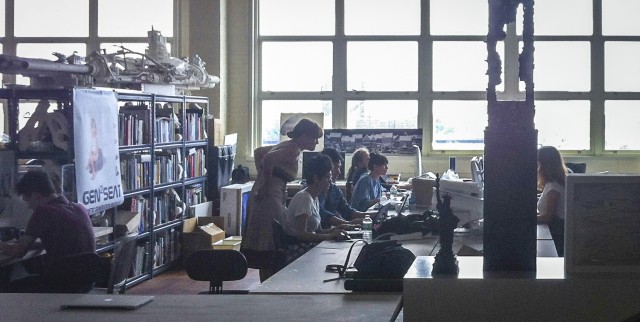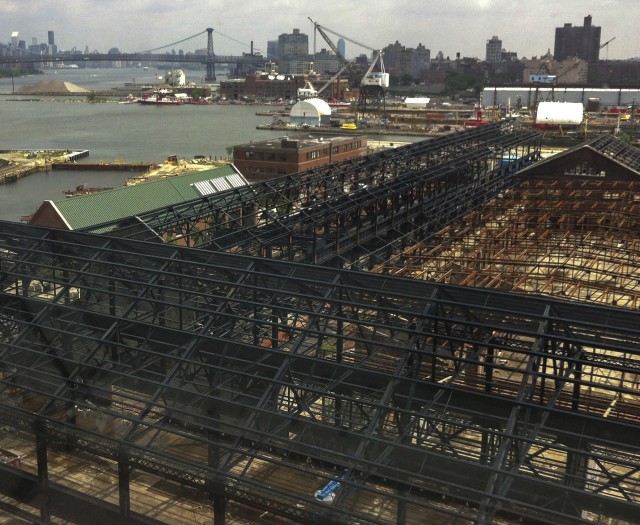When Sandy hit the Brooklyn Navy Yard, the damage was not equally absorbed across this historic industrial site. Some tenants, like Steiner Studios, thankfully had no damage. Other businesses suffered up to $1 million in losses. According to the New York Times, most tenants don’t have immediate (or any) plans of relocation away from New York’s largest and oldest industrial facility, but there is still recovery underway. The yard lives on: there are new businesses planning on moving in, or those that have set down roots very recently. How will the historic site look in a year? In ten? We’re taking a look into one new, “green” piece of the industrial fabric.
New Lab is a workspace for green entrepreneurs, manufacturers, and designers in the Brooklyn Navy Yard. Founded by president David Belt of Macro Sea, a real-estate development firm, and Scott Cohen, an artist and entrepreneur, New Lab promises to be a city leader in blending innovative companies under one roof.
New Lab’s Beta Space
The Brooklyn Navy Yard has a history of manufacturing dating to the eighteenth century. Originally a shipyard for the Navy, but decommissioned in 1966, it is now a place for commercial manufacturing, and holds upwards of two hundred companies and five thousand employees. The Navy Yard is situated next to DUMBO, a hub for tech activity in Brooklyn.
The current tenants of New Lab work in Beta Space, while the future New Lab building is under construction with a possible 2015 completion. Plans for the completed building will include ten times the current volume of companies that the Beta Space houses, a central community space for lectures and presentations, facilities for rapid prototyping and material fabrication. Currently in the Beta Space is a light artist, product consultant, architecture firm, biotech engineer, and various other digital manufacturers and industrial designers. Innovation threads these disparate entrepreneurs together.
The New Lab team preserved the frame of a previously decommissioned building.
Alex Escamilla, senior project director at Macro Sea, states that David Belt and Scott Cohen differ from other NYC developers because of their vision. New Lab is a twenty-one million dollar project, funded through private equity, as well as government grants for creating jobs and preserving a historic site. In other words, it is far from a quick-return investment. New Lab’s two founders are committed to environmental responsibility and progress.
New Lab distinguishes itself from other similar manufacturing spaces with its focus on green technology and its mission to bring entrepreneurs with disparate interests together in a creative, rather than competitive, environment. How will this vision and style of business reflect, influence, or otherwise fit into a post-Sandy, “resilient” New York?
We’ll be tracking developments at the Navy Yard as part of our ongoing coverage of the city defined by improved standards of resiliency and economic diversity.

